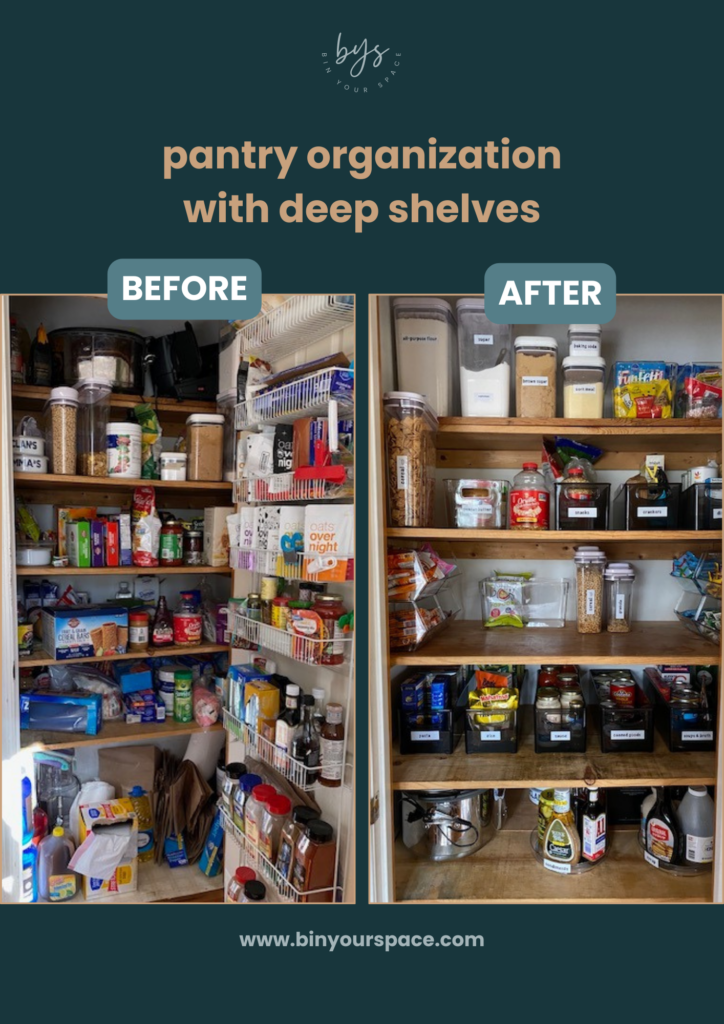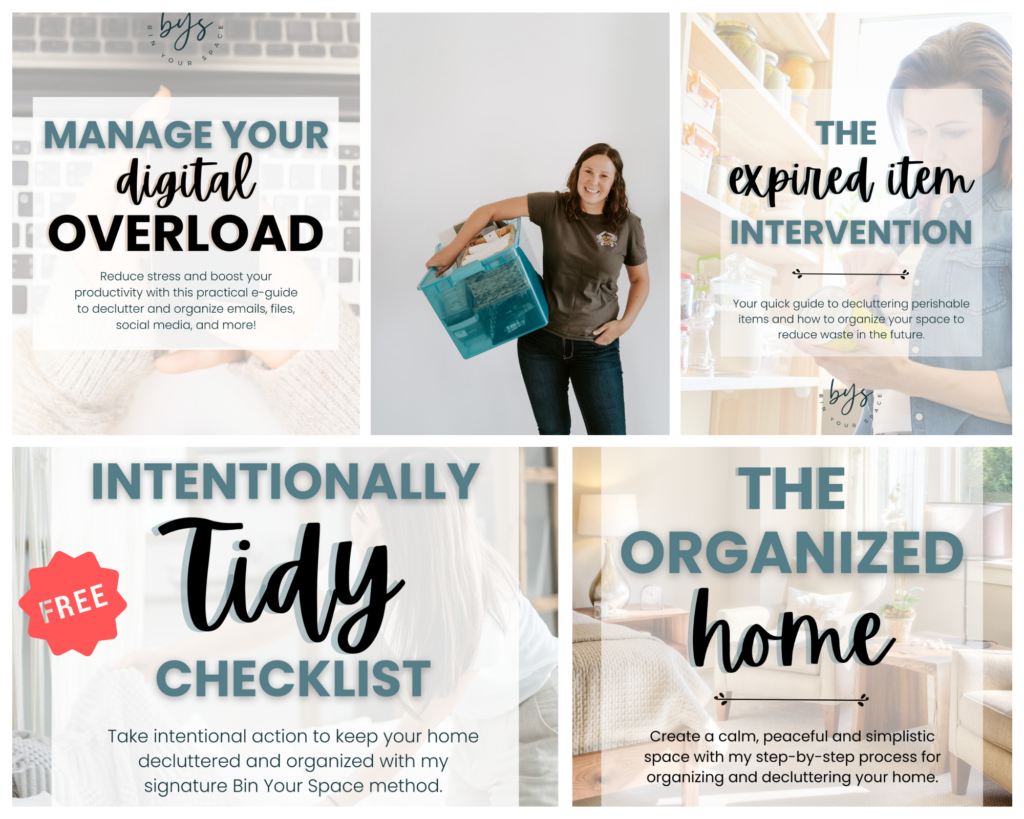Whether you’re a busy mom, a single parent juggling it all, an older adult with a lifetime of memories, or a homeowner struggling with clutter, you’re not alone. To regain your peace of mind when overwhelmed by “stuff,” you must understand decluttering vs. organizing.
Many of us, including me, feel frustrated and anxious in cluttered spaces. So, I want to help you understand this distinction between decluttering and organizing and give you solutions to help you get started.

Decluttering vs. Organizing: The Essential First Step
It’s tempting to jump straight into buying bins and shelves, thinking that organizing will solve your problems. But without decluttering first, you’re just organizing clutter.
Here’s the basic difference between decluttering and organizing.
- Decluttering: This is the act of deciding what to keep and what to let go of. It’s about making tough choices and freeing yourself from unnecessary belongings.
- Organizing: This is the process of arranging the items you’ve already decided to keep in a way that’s functional and visually appealing for your daily life.
My friend Tina and I discuss in our podcast, Declutter Diaries, how you can’t effectively organize a space that’s filled with things you don’t need or love.
Think of decluttering as clearing the weeds from your garden before planting flowers.
In order for flowers to bloom, there has to be space. Weeds, like clutter, must be removed first before other plants can grow and thrive.
Why Decluttering Feels Hard (and How to Make it Easier)
Let’s be honest, decluttering is emotionally challenging. Items often hold sentimental value and letting go can feel like losing a part of ourselves.
Honoring Memories
The true value of sentimental items lies in the emotions they bring up, not the objects themselves.
To preserve these precious connections, take time to write down or voice record the stories associated with each item. This will help you capture the feelings and experiences they represent and why the item is so special to you.
Create a digital journal or a physical memory book filled with these stories and accompanying photos. By focusing on the emotion and the story, you can honor the memories without being burdened by the physical weight of the objects.
Acknowledge the Emotion
Decluttering can be a healing process allowing you to release emotional baggage and create space for new experiences.
Don’t suppress your feelings; acknowledge them.
Allow yourself to grieve the loss of certain items or memories, but remember that letting go doesn’t mean forgetting. By allowing yourself to feel, you’re paving the way for emotional growth and a more calm clutter-free life.
Start Small When Decluttering
Start by setting realistic expectations for yourself.
Decluttering takes time and energy. Dedicate small blocks of time—even 5-15 minutes—to decluttering a specific area. Write this event on your calendar so you know it will happen.
Start with something that can be completed within that time frame like the nightstand, a drawer in your desk, the stack of papers that’s been piling up on the kitchen counter, or the clothes pile next to your bed.
This approach makes the process less overwhelming and easier to fit into your busy schedule.
Remember, consistency is key. Small, regular decluttering sessions are more effective than sporadic, marathon attempts or rage cleaning.

Beyond the Stuff: The Emotional Connection to Clutter
Sometimes, holding onto things is less about the items themselves and more about the feeling of control they provide. This is especially true for those who have experienced a lack of control in their lives.
Self-Reflection
Your belongings tell a story. Take time to listen.
Why are you holding onto these items? Are they tied to a specific memory, a past version of yourself, or an idealized future? Are you afraid of losing that connection by letting them go? Do they provide a sense of comfort or security?
Exploring these “why” questions can be so insightful.
Digging into your own stories can really shine a light on your relationship with your stuff, helping you make choices that feel more intentional (and less cluttered).
Therapeutic Approach to Decluttering and Organizing
Think of decluttering as more than just tidying up – it can be a really powerful way to take charge of your space and, honestly, your life. It’s about realizing that you are so much more than just your stuff; you’re defined by the choices you make every day.
When you consciously decide what to keep and what to release, you’re actually taking back control and creating a home that truly feels like you. This process can bring a real sense of empowerment and belief in your own ability to make positive changes.
Creating Space, Inside and Out
When you understand that decluttering is about letting go and organizing is about putting things in their place – and when you acknowledge the emotions tied to your stuff – you can truly create a home that feels more peaceful, works better for you, and brings you less stress.
Remember, this isn’t about achieving some impossible standard of perfection; it’s about making small, consistent steps forward.
DIY Organization You Can Take and Run With!
Eager to DIY your way to an organized home? My guide is your go-to resource!
It’s packed with clear steps to declutter first, followed by room-by-room organizing strategies. Plus, I’ve taken the guesswork out of storage with over 60 container recommendations!
And remember, you’re not alone in this! As a professional organizer, I’m here to cheer you on and offer support.
In fact, I dive deep into the connection between our mental well-being, clutter, and organizing on my podcast, The Declutter Diaries, with my wonderful friend Tina Wolff, a licensed therapist. Listen to all the episodes on this very topic on Apple, Spotify, or YouTube!
What’s Your Take On Decluttering vs. Organizing?
We’re all in this together! Share your decluttering challenges or successes in the comments below. What strategies have worked for you? What emotional hurdles have you overcome?
Let’s create a supportive community where we can learn from each other’s experiences. And, because we know it’s a common struggle, tell us about those sentimental items you have trouble letting go of. What stories or memories are attached to them?

Bonnie Hintenach | Bin Your Space
Professional Organizer for Homes & Classrooms
Maryland Professional Organizer
